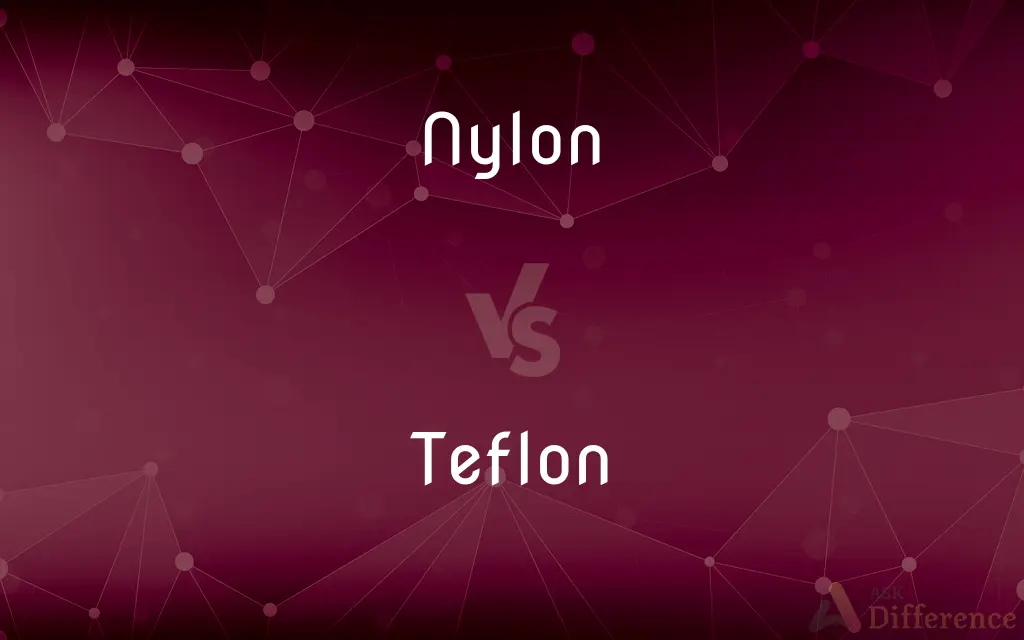Nylon vs. Teflon — What's the Difference?
Edited by Tayyaba Rehman — By Fiza Rafique — Updated on September 25, 2023
Nylon is a synthetic polymer used primarily in textiles, while Teflon is a brand name for PTFE, known for its non-stick properties.

Difference Between Nylon and Teflon
Table of Contents
ADVERTISEMENT
Key Differences
Nylon and Teflon are both synthetic materials, yet they serve diverse applications. Nylon is a type of polyamide synthesized from petrochemicals and is often used in the manufacture of textiles and plastic products. On the other hand, Teflon is a trademarked name for polytetrafluoroethylene (PTFE), a polymer with unique non-stick properties.
In the textile industry, Nylon stands out due to its strength and elasticity. You'd find Nylon in clothing, carpets, and ropes. Meanwhile, Teflon, with its resistance to high temperatures and adherence, is commonly applied as a non-stick coating for cookware such as frying pans.
Beyond textiles, Nylon is valued in various industries for its durability. You might find Nylon used in gears, bushings, and even automotive parts. Contrarily, Teflon is also utilized outside the kitchen. Its non-reactive nature makes it a prime choice for seals, gaskets, and linings in the chemical industry.
The care and maintenance for products made of Nylon and Teflon differ. Nylon products, especially textiles, might require specific washing instructions to maintain their form and color. In contrast, Teflon-coated products are often prized for easy cleaning, given their non-stick characteristic.
Lastly, while both Nylon and Teflon are synthetic, their environmental impact differs. Nylon production involves significant energy and can contribute to greenhouse gas emissions. Teflon, when overheated, can release fumes that might be harmful to birds and can cause flu-like symptoms in humans.
ADVERTISEMENT
Comparison Chart
Basic Composition
Synthetic polyamide
Polytetrafluoroethylene (PTFE)
Primary Use
Textiles, plastic products
Non-stick coatings, seals, gaskets
Properties
Strong, elastic, durable
Non-stick, high-temperature resistance, non-reactive
Care
Specific washing instructions
Easy cleaning due to non-stick properties
Environmental Concerns
Energy-intensive production, greenhouse gas emissions
Possible release of harmful fumes when overheated
Compare with Definitions
Nylon
Found in various plastic products.
The gears are constructed from high-quality Nylon.
Teflon
Resistant to high temperatures and chemical reactions.
The Teflon seals are used in chemical processing.
Nylon
A synthetic polymer derived from petrochemicals.
The hiking backpack is made of durable Nylon.
Teflon
A brand name for polytetrafluoroethylene (PTFE).
The pan has a Teflon coating to prevent sticking.
Nylon
Used in textiles due to its strength and elasticity.
The tights are 100% Nylon.
Teflon
Can release harmful fumes if overheated.
Do not preheat empty Teflon-coated pans.
Nylon
Resilient and resistant to wear and tear.
The Nylon rope can hold heavy weights.
Teflon
Known for its non-stick properties.
The Teflon-coated skillet is perfect for frying eggs.
Nylon
Nylon is a generic designation for a family of synthetic polymers composed of polyamides (repeating units linked by amide links). Nylon is a silk-like thermoplastic, generally made from petroleum, that can be melt-processed into fibers, films, or shapes.
Teflon
Often used for easy-to-clean cookware.
The Teflon pot cleans up with just a wipe.
Nylon
Any of a family of high-strength, resilient synthetic polymers, the molecules of which contain the recurring amide group CONH.
Teflon
Polytetrafluoroethylene, PTFE
Nylon
Cloth or yarn made from one of these synthetic materials.
Teflon
(metaphorically) Non-stick, slick.
Nylon
Nylons Stockings made of one of these synthetic materials.
Teflon
Able to easily shrug off or deflect criticism or blame.
The teflon Prime Minister
Nylon
Originally, the DuPont company trade name for polyamide, a copolymer whose molecules consist of alternating diamine and dicarboxylic acid monomers bonded together; now generically used for this type of polymer.
Teflon
A material used to coat cooking utensils and in industrial applications where sticking is to be avoided
Nylon
(in the plural) A stocking originally fabricated from nylon; also used generically for any long, sheer stocking worn on a woman's legs.
I tore a hole in my nylons while walking home through the woods.
Teflon
Not to be trusted;
How extraordinarily slippery a liar the camera is
They called Reagan the teflon president because mud never stuck to him
Nylon
(perjoratively, by comparison to silk) A Queen's Counsel, King's Counsel or Senior Counsel who was appointed as a courtesy, rather than on merit.
Nylon
Any of several thermoplastic polyamide plastics, comprising a family of high-strength resilient synthetic materials, used mostly in fibers.
Nylon
A synthetic fabric consisting of fibers of nylon[wn1].
Nylon
Stockings made of a thin form of nylon{2}, especially full-length stockings either sheer of of varying shades.
Nylon
A thermoplastic polyamide; a family of high-strength resilient synthetic materials
Nylon
A synthetic fabric
Nylon
Often requires specific care in textiles.
This Nylon shirt should be washed in cold water.
Common Curiosities
Can Nylon be used as a non-stick coating like Teflon?
No, Nylon doesn't have the non-stick properties inherent in Teflon.
Why is food less likely to stick to Teflon pans?
Teflon has unique non-stick properties that prevent adherence of food.
Can Nylon products melt?
Yes, Nylon can melt or deform when exposed to high temperatures.
Is Teflon only used in kitchen products?
No, Teflon is used in various applications, including industrial ones like seals and gaskets.
Is it safe to use scratched Teflon cookware?
Scratched Teflon can cause the coating to flake off, which might not be safe for consumption.
Do Nylon and Teflon have environmental concerns?
Yes, Nylon production can be energy-intensive, while Teflon can release harmful fumes when overheated.
Does Teflon react with acidic foods?
No, Teflon is non-reactive, making it safe for cooking acidic foods.
Why are Nylon carpets popular?
Nylon carpets are durable, resistant to wear, and easy to clean.
Are Nylon and Teflon both forms of plastic?
Yes, both Nylon and Teflon are synthetic polymers, commonly referred to as plastics.
Can Teflon coatings wear off over time?
Yes, with repeated use, Teflon coatings can degrade or wear off.
Are Nylon and Teflon naturally occurring materials?
No, both Nylon and Teflon are synthetically manufactured.
Is Nylon used in automotive parts?
Yes, Nylon is used in various automotive components due to its strength.
Can Nylon products be recycled?
Yes, Nylon can be recycled, though the process might vary based on the product.
Are there health concerns related to Teflon?
Overheated Teflon can release fumes that might be harmful to birds and cause flu-like symptoms in humans.
Is Nylon water-resistant?
Yes, Nylon has water-resistant properties, making it suitable for outerwear.
Share Your Discovery

Previous Comparison
Inroad vs. Inroads
Next Comparison
Enterprise vs. CorporateAuthor Spotlight
Written by
Fiza RafiqueFiza Rafique is a skilled content writer at AskDifference.com, where she meticulously refines and enhances written pieces. Drawing from her vast editorial expertise, Fiza ensures clarity, accuracy, and precision in every article. Passionate about language, she continually seeks to elevate the quality of content for readers worldwide.
Edited by
Tayyaba RehmanTayyaba Rehman is a distinguished writer, currently serving as a primary contributor to askdifference.com. As a researcher in semantics and etymology, Tayyaba's passion for the complexity of languages and their distinctions has found a perfect home on the platform. Tayyaba delves into the intricacies of language, distinguishing between commonly confused words and phrases, thereby providing clarity for readers worldwide.














































